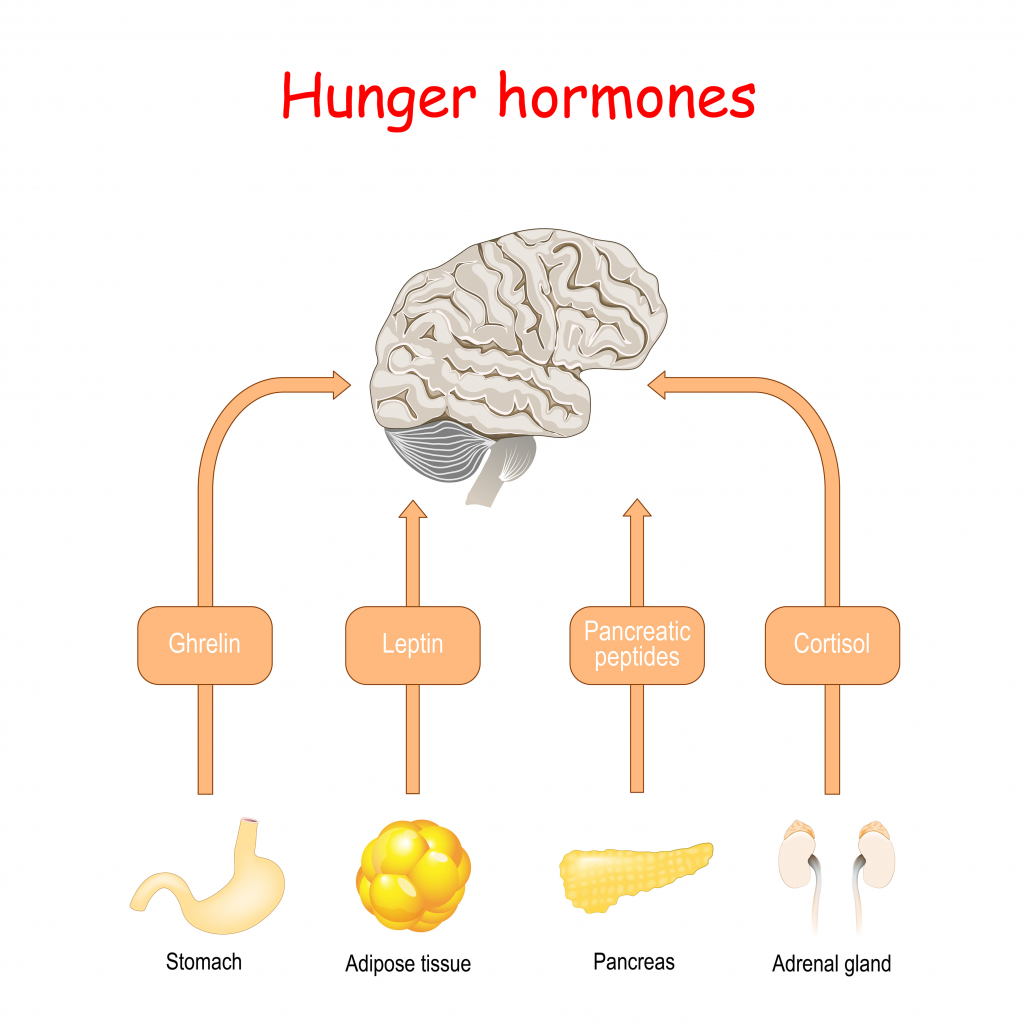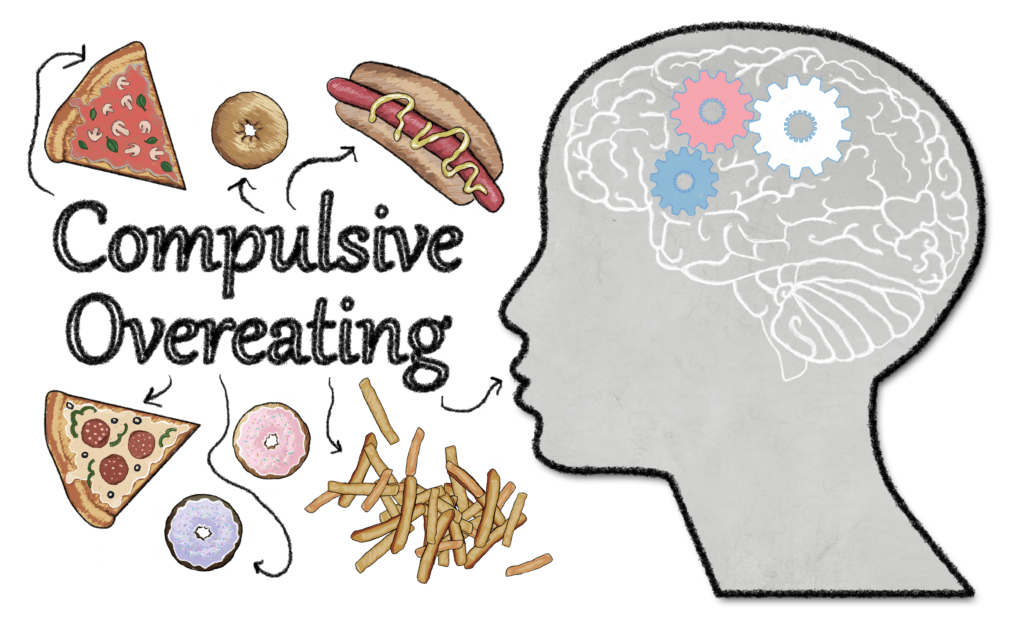We include products in articles we think are useful for our readers. If you buy products or services through links on our website, we may earn a small commission.
What is Emotional Eating and Stress Eating?

Many of us impulsively eat when feeling stress and other uncomfortable emotions. A habit of eating to soothe, numb, and suppress unwanted emotions is called ‘stress eating’ or ‘emotional eating’ [1].
Stress eating is often accompanied by shame and guilt, creating a feedback loop of negative feelings and overeating.
In this article, we’ll explore the root causes of emotional and stress eating and offer numerous proven techniques for changing, reducing, and eliminating emotional eating habits.
Table of Contents
How Stress Affects Appetite
When you’re stressed, your body unleashes numerous stress hormones like cortisol, adrenaline, and norepinephrine [2].
In small doses, the experience of stress and anxiety is a benefit. Humans evolved a stress response to tune us into possible threats and to focus our attention on critical tasks.
But in modern society, with its 24-hour news cycle and a social media environment that captures our attention with distressing news, stress, and other negative emotions can be chronic.
The prevalence of stressors in our modern life is reflected in the findings of an American Psychological Association survey: One-fourth of Americans rate their stress level as eight or more on a 10-point scale [3].
Stress and Hunger Hormones

Our bodies respond to stress by first pumping out adrenaline (epinephrine). This hormone triggers us into a fight-or-flight response that shuts down our appetite.
But when stress continues unabated, our bodies secrete the stress hormone cortisol and the hunger hormone ghrelin.
Cortisol increases appetite and motivation to eat, while ghrelin increases appetite and reduces depressive feelings [4]. These responses make sense in the context of our ancestral hunter gatherer lifeways.
For our cavemen and women ancestors, stress was most often triggered by calorie restriction. The body responds to caloric restriction by motivating people to find food and rewarding them by secreting natural antidepressant chemicals–ghrelin has both hunger and antidepressant effects [5].
Once stressful triggers subsided, levels of stress hormones would decrease. But when stressors are constant, our stress hormones are stuck in overdrive. Cortisol and ghrelin stay elevated, motivating us to constantly eat.

How to Tell if You are an Emotional and Stress Eater
- When you’re feeling stressed, do you notice eating more?
- Do you continue to eat even when you’re full?
- Do you eat to soothe feelings of sadness, boredom, and anxiety?
- Is food a reward you give yourself after going through a challenging or stressful experience?
- Do you enjoy stuffing yourself past the feeling of fullness?
- Does eating provoke feelings of safety?
- Do you feel towards food like it was a friend?
- Do you feel like you don’t have control over your food cravings and how much you eat?
Emotional and Stress Eating Triggers
Stress and negative emotions can lead to feelings of isolation and inadequacy and trigger cycles of negative self-talk that further diminish self-esteem.
Factors that lead to and exacerbate emotional eating include:
- Lack of or retreating from social support when feeling emotional need
- Lack of physical and social activities that alleviate stress and support emotional wellbeing
- Not knowing and tracking the difference between emotional and physiological hunger
- Being overwhelmed by cycles of negative self-talk
- Elevated cortisol and ghrelin hormone levels in response to stress
Carb Addiction and Emotional Eating
Most people who emotionally eat tend to binge on high glycemic processed foods.
A 2013 study by Harvard researcher David Ludwig found that even when people don’t know what they’re eating, people who consumed high-GI carbs had greater activation of opiate and dopamine receptors in the craving and reward center of the brain [6].
These “happy” chemicals are responsible for making us feel good when we’re spending time with friends and people we love [6]. So it’s easy to see how stimulating these chemicals with food can be a substitute when we have relational and emotional voids in our lives.
Other research shows how when you accumulate body fat, which often occurs when caught in cycles of emotional and stress eating, your body will trigger hunger hormones in an attempt to preserve the fat you have accumulated [7].
How to Stop Stress Eating
There are numerous ways to stop emotional eating. Each targets the connection between emotions, hormones, and hunger in different ways. Some approaches work by activating the body through physical activity, while others work by using the mind to disrupt the link between emotions and cravings.
Practice Mindful Eating
A key to overcoming stress eating is to create awareness around the difference between emotional hunger and ‘true’ physiological hunger.
Interrupting the emotion/craving cycle is a key aspect of mindfulness meditation and the foundation of mindful eating practices.
Not surprisingly, research shows that obese patients report that stress is a trigger for binge eating [8].
The good news is that various studies support the view that mindful eating can drastically reduce the severity and frequency of emotional binge eating [9][10][11].
A key to mindful eating practices is how they can help you differentiate stress triggers from physical hunger. This moment of bringing awareness into the habit cycle creates a space from which you can make healthier choices [9].
| Emotional Hunger | Physiological Hunger |
| Your hunger feels like a craving that arises suddenly and with great or overwhelming intensity | Hunger develops over time and does not overwhelm your other thoughts and feelings |
| You crave sugary, processed, addictive foods like pizza and cookies | You desire highly satiating nutrient-dense whole foods like red meat, seafood, and fat |
| You can binge on high-carb foods and crave more even when physically full | You feel full, satisfied, and stop eating without resistance |
| You feel guilt or shame about eating | You feel emotionally neutral, satisfied, or appreciative after eating |
Reduce Distractions
Many people combine emotional eating with emotional media consumption. Do you find yourself eating while watching TV, surfing the web, or scrolling through social media?
A 2011 study by the USDA found that most Americans spend some portion of their day eating while distracted by TV, work, grooming, and driving [9].
A Stanford study found that 20% of all American meals are consumed in the car [12].
Next time you eat, try bringing all of your awareness to the act of eating. Notice the taste and texture of the food.
Chewing mindfully by counting your chews (10-32 is a common window) can help you slow down and respond to your body’s physical hunger and satiety cues.
Low-Intensity Exercise
Low-intensity exercises are powerful and supportive ways to regulate your nervous system, balance hormones, and promote positive emotional states that can reduce emotional eating.
On the other hand, high-intensity exercises like CrossFit are a new and potentially stress-inducing and physically degrading addition to the extremes of modern life.
Fascinatingly, studies comparing lower intensity exercise with “vigorous-intensity activity” (VPA) show that lower intensity exercises can reduce emotional eating, while VPA can increase the negative influence of anxiety on binge eating [10].
Popular low-intensity exercises include:
- Walking
- Stretching
- Yoga
- Cycling
- Swimming
- Hiking
- Standing and walking in an office/work setting–assisted by a standing desk
For many people, walking is the most accessible low-intensity intervention, but that doesn’t make it any less effective.
In fact, our hunter-gatherer ancestors got most of their physical exercise from walking.
Research on some of the last hunter gatherer tribes shows that they walk between 7 and 12 miles per day [6]. Studies show that walking increases vigor reduces stress, and improves mood [13].
Cycling is another accessible activity that has been shown to reduce stress and, interestingly, to lead to deeper levels of spirituality–potentially filling the void that many seek to fill with food when emotionally eating [14].
Practicing yoga regularly has been shown to help diffuse emotional states such as anxiety and depression associated with emotional eating [15].
A 2016 study found that Yoga practice combined with outpatient eating disorder treatment was shown to decrease anxiety, depression, and body image disturbance [16].
Adopt a Low-Carb, High-Fat Diet
A low-carb, high-fat diet can directly target the hormonal triggers associated with emotional binge eating.
A 2019 study of 19 obese men and women looked at the effects of a diet composed of 25 grams carbs, 100 grams protein, and 100 grams fat on weight loss and cravings. These ratios essentially constitute a low-carb, high-fat moderate-protein ketogenic diet.
After only 4 weeks, the male participants lost an average of about 16 pounds (7.2 kg). The female participants lost an average of about 10 pounds (4.7 kg). Across both groups fasting insulin levels decreased by an average of 34%.
All participants reported reduced cravings for most foods. Interestingly, cravings for sweets decreased significantly more in women than in men. Additionally, sugar cravings dropped the most in people who had begun with the highest cravings [17].
Low-Carb High-Fat Foods
Low-carb, high-fat foods are the most nutrient-dense and healthiest foods in the world.
Ruminant meats like ribeye steak, full-fat dairy including homemade keto ice cream, eggs, fatty fish, and healthy whole-food fats.
Numerous nutrients found only in meat have powerful mood-boosting effects, including B12 carnitine, carnosine, taurine, and choline.
Reduce Omega-6 Fats
The standard American diet is loaded with industrial vegetable oils high in omega-6 fatty acids.
Omega-6 oils are pro-inflammatory. not surprisingly, research links an overabundance of omega-6s to mood disorders such as depression and bipolar disorder [18][19].
Replacing omega-6-rich foods with whole food fats and omega-3s can reduce the negative emotions that drive emotional eating habits.
Earthing and Grounding
Earthing and grounding are two names for the practice of connecting your body to the natural electrical charge of the earth.
It may sound far out, but it’s as simple as walking barefoot outdoors, lying on a beach, and swimming in natural bodies of water.
You can also practice earthing in your bed or at your desk by using grounding systems like pads and blankets that connect to the ground socket of your household electricity [20].
A randomized control trial from 2019 looking at the effects of grounding (earthing) on massage therapists using grounding mats found that “As a group, therapists experienced significant increases in physical function and energy and significant decreases in fatigue, depressed mood, tiredness, and pain while grounded as compared to not being grounded. At one-month following the study, physical function was also increased and depressed mood and fatigue were decreased” [21].
These powerful mood-regulating effects suggest that earthing may be effective in curbing emotional eating.
Practicing Gratitude
Practicing gratitude offers numerous benefits that are so powerful and transformative that they can be detected in changes to structures in the brain [22]
One study found that practicing gratitude helps maintain other self-care routines like yoga and healthy eating [23]
Numerous other benefits of practicing gratitude that may reduce emotional and stress eating include:
- Increased positive emotions [24]
- Strengthened immune system [25]
- Improved sleep[26]
- Increased self-esteem [27]
- More and higher quality relationships [28]
- increased productivity and satisfaction in the workplace [29] [30]
Try these 3 proven techniques for practicing gratitude in your everyday life.
Meditation to Reduce Stress Eating
There are many types of meditation that have been shown to reduce stress and anxiety.
Numerous studies looking specifically at mindfulness meditation have found it effective as a treatment for binge eating and emotional eating [31].
Certain breathing meditations have been shown to be especially effective at reducing stress and anxiety.
There are numerous free resources you can use, such as Jason Stephenson’s YouTube video with over 5 million views: “Guided Meditation for Anxiety & Stress“
Remove Addictive Foods from Your Pantry
One of the most effective strategies for reducing addictive behaviors is by changing your environment.
In the case of emotional eating, this means eliminating or donating addictive foods. Frozen pizzas, juices, sodas, bread products like bagels and pastries, most packaged and high-carb processed foods like chips, cereals, and high-sugar ice creams can all be jettisoned.
Practice Positive Thinking
Positive thinking practices disrupt and override the cycles of shame and guilt associated with emotional eating.
Positive thinking practices include:
- positive self-talk
- positive affirmations,
- identifying negative thinking patterns
- setting daily intentions
Practicing positive self-talk means being mindful of the voice in your head and responding with positive messages and affirmations.
Negative thinking patterns are common but when we notice them we can question them and offer alternatives.
Negative thinking patterns often look like this:
- Magnifying negative aspects of a situation and omitting the positive
- Blaming yourself for any and all challenges in your life
- Expecting the worst possible outcome without supporting evidence
- Obsessing over perfection or unattainable goals and thereby setting yourself up for failure–a self-defeating habit
These negative thinking patterns can be addressed by setting daily intentions. These are micro-goals that we can achieve throughout each day. Examples could be:
- I will express gratitude to my co-workers
- I will lead by example
- I will take rest seriously
- I will pay attention to the sensations in my body when I’m feeling strong emotions
Practice Dr. Kiltz’s Three Pillars of Health and Wellness
Dr. Kiltz’s three pillars of health and wellness are a way of combining all the above principles into a holistic lifestyle approach.
Dr. Kiltz’s three pillars are:
- Eating high-fat, low-carb whole foods–ideally, foods only found on a carnivore diet food list with some wiggle room for french fries and low-sugar keto ice cream
- Intermittent feasting (AKA intermittent fasting)–ideally, one meal a day (OMAD)
- Regulating the nervous system with mindfulness meditation, positive psychology, and low-impact and restorative movement
Additional Support
Reach out to a friend. Even a short phone call with someone who knows and cares about you can be extremely stress-relieving.
There are also free and accessible communities and organizations like Overeaters Anonymous that extend an open hand to anyone in need of more support.
Emotional and Stress Eating: The Takeaway
Emotional and stress eating occurs when we impulsively eat in order to soothe, suppress, and avoid stress and challenging emotions.
Emotional eating has both environmental and physiological components. In short bursts, stress is a helpful adaption to identifying threats and motivating us towards protective actions.
But in modern life, we’re saturated with stressors that our hunter gatherer ancestors were not subjected to. This leads to chronic stress and anxiety flooding our bodies with hunger-inducing hormones.
You can reduce and eliminate emotional eating with numerous practices such as:
- Mindful eating practices
- Low-intensity physical activity
- Adopting a low-carb, high-fat diet
- Practicing gratitude
- Practicing meditation
- Earthing and grounding exercises
- Positive thinking practices
- Eliminating processed foods from your panty
- Additional help from support groups





















